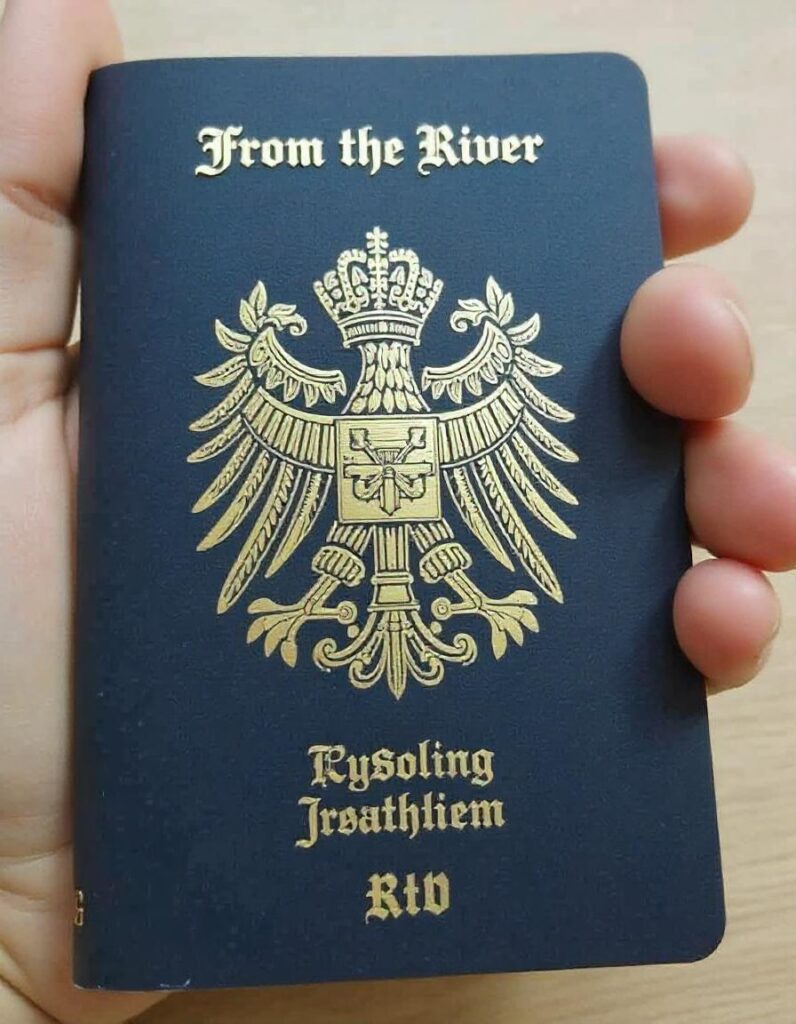
In a significant policy development, Germany has announced that individuals who use the phrase “From the River to the Sea” or post maps that replace the territory of Israel with the Palestinian flag will be denied German citizenship. This decision is part of the country’s ongoing efforts to combat anti-Semitism and hate speech, reflecting Germany’s commitment to promoting a society that is inclusive, tolerant, and respectful of all backgrounds.
The Meaning Behind the Phrase ‘From the River to the Sea’
The phrase “From the River to the Sea” has historical and political significance in the Israeli-Palestinian conflict. It is often interpreted as a call for the elimination of the State of Israel, as it suggests the establishment of a Palestinian state spanning from the Jordan River to the Mediterranean Sea, effectively removing Israel from the map. For many, this phrase is a symbol of Palestinian resistance and the demand for statehood, but for others, particularly in Israel and among its allies, it represents a denial of Israel’s right to exist and a call for the destruction of the Jewish state.
As tensions surrounding the Israeli-Palestinian conflict continue to manifest globally, slogans like “From the River to the Sea” have been perceived as rallying cries for extremist movements. These movements advocate not just for Palestinian sovereignty but for the erasure of Israel, which many governments, including Germany, view as an incitement to violence and hatred.
Germany’s Policy on Hate Speech and Citizenship
Germany’s decision to deny citizenship to individuals who propagate such messages is grounded in the country’s commitment to combating all forms of discrimination, including anti-Semitism. While freedom of speech is a protected right in democratic societies, Germany is drawing a firm line when it comes to speech that promotes hate or violence. The government’s stance is clear: advocating for the destruction of any country or inciting hostility toward a particular ethnic or religious group crosses the boundaries of acceptable discourse.
This new policy also applies to individuals who use maps that erase Israel by replacing its territory with the Palestinian flag. Such maps symbolize a refusal to recognize Israel’s legitimacy as a sovereign state, and in Germany, this act is seen as a violation of laws designed to protect social harmony and uphold the principles of international law. By denying citizenship to individuals who engage in these activities, Germany is making it known that it will not tolerate rhetoric that undermines peaceful coexistence.
Germany’s Historical Responsibility to Combat Anti-Semitism
Germany’s aggressive stance on anti-Semitism is shaped by its dark history. The atrocities of the Holocaust, in which six million Jews were systematically murdered, were perpetrated by the Nazi regime. In the post-war years, Germany has worked tirelessly to confront this past, seeking to ensure that such horrors are never repeated. As part of this reckoning, Germany has enacted some of the world’s strictest laws against hate speech, Holocaust denial, and anti-Semitism.
The denial of citizenship to those who espouse anti-Israel sentiments is consistent with Germany’s broader efforts to address hate speech and protect minority communities, particularly its Jewish population. By taking decisive action, the German government sends a message that it will not allow the past to repeat itself, and that it remains committed to creating an environment where Jews and other minority groups feel safe and welcome.
Balancing Free Speech and Hate Speech
Critics of Germany’s new policy argue that it may infringe on freedom of expression, a cornerstone of democratic societies. They assert that individuals have the right to express their views on contentious issues such as the Israeli-Palestinian conflict, even if those views are unpopular or controversial. The question that arises, then, is whether limiting such speech, in this case, constitutes an overreach by the government.
However, it is important to differentiate between free speech and hate speech. While free speech allows individuals to express their opinions and engage in political discourse, hate speech is defined as speech that incites violence, discrimination, or hostility against a particular group. Advocating for the destruction of a country or the displacement of its people falls squarely within the realm of hate speech, which many legal systems, including Germany’s, regulate in order to maintain social order and protect vulnerable communities.
Germany’s policy does not prevent individuals from criticizing Israel or advocating for Palestinian rights. It only targets those who cross the line into hate speech by promoting the elimination of Israel as a state or by using symbols that deny Israel’s right to exist. The aim is not to suppress legitimate political discourse but to curb rhetoric that fosters division, animosity, and violence.
The Broader Context: Global Efforts to Tackle Hate Speech
Germany’s decision to deny citizenship to individuals engaging in anti-Israel hate speech is part of a broader international effort to combat the rise of hate speech, which has been exacerbated by social media and political polarization. Hate speech, whether online or offline, has the potential to fuel real-world violence, as demonstrated by the alarming increase in hate crimes globally.
Many countries are grappling with how to regulate hate speech while respecting freedom of expression. The rise of anti-Semitism in Europe and the United States, coupled with the growing prominence of far-right and extremist ideologies, has led to renewed discussions about how societies can protect marginalized communities without infringing on civil liberties.
Germany’s approach may serve as a model for other countries seeking to draw a line between free speech and incitement. By implementing policies that prioritize the protection of vulnerable groups, while still allowing space for robust political debate, Germany demonstrates that it is possible to defend democratic values without tolerating hate.
The Importance of Promoting Tolerance and Coexistence
Germany’s new policy reflects a broader commitment to fostering a society based on tolerance, respect, and peaceful coexistence. The denial of citizenship to individuals who promote hatred against Israel is not just about protecting one particular group; it is about upholding the principles of equality and human dignity that are central to a functioning democracy.
In a world where political conflicts often spill over into hate and violence, it is more important than ever for countries to take a stand against rhetoric that fuels division. By setting clear boundaries on what is and is not acceptable, Germany is reaffirming its dedication to creating an inclusive society where people of all backgrounds can live together in peace.
Conclusion
Germany’s decision to deny citizenship to individuals who use the phrase “From the River to the Sea” or post maps that erase Israel is a bold and necessary step in the fight against hate speech and anti-Semitism. While some may argue that it infringes on free speech, the policy is intended to strike a balance between protecting democratic freedoms and preventing the spread of hateful rhetoric that threatens social harmony.
By taking a firm stand against those who promote the elimination of Israel, Germany is sending a message that it will not tolerate intolerance. In doing so, it sets a powerful example for the global community, emphasizing the importance of promoting peace, understanding, and respect for all nations and peoples.
Click here for more Article : https://socialinfozone.com/
